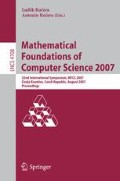Abstract
The cornerstone of any algorithm computing all repetitions in strings of length n in \({\mathcal O}(n)\) time is the fact that the number of maximal repetitions (runs) is linear. Therefore, the most important part of the analysis of the running time of such algorithms is counting the number of runs. Kolpakov and Kucherov [FOCS’99] proved it to be cn but could not provide any value for c. Recently, Rytter [STACS’06] proved that c ≤ 5. His analysis has been improved by Puglisi et al. to obtain 3.48 and by Rytter to 3.44 (both submitted). The conjecture of Kolpakov and Kucherov, supported by computations, is that c = 1. Here we improve dramatically the previous results by proving that c ≤ 1.6 and show how it could be improved by computer verification down to 1.18 or less. While the conjecture may be very difficult to prove, we believe that our work provides a good approximation for all practical purposes.
For the stronger result concerning the linearity of the sum of exponents, we give the first explicit bound: 5.6n. Kolpakov and Kucherov did not have any and Rytter considered “unsatisfactory” the bound that could be deduced from his proof. Our bound could be as well improved by computer verification down to 2.9n or less.
This work has been done during the second author’s stay at Institut Gaspard-Monge.
Access this chapter
Tax calculation will be finalised at checkout
Purchases are for personal use only
Preview
Unable to display preview. Download preview PDF.
References
Apostolico, A., Preparata, F.: Optimal off-line detection of repetitions in a string. Theoret. Comput. Sci. 22(3), 297–315 (1983)
Crochemore, M.: An optimal algorithm for computing the repetitions in a word. Inform. Proc. Letters 12, 244–250 (1981)
Crochemore, M., Ilie, L.: A simple proof that the number of runs in a word is linear (manuscript, 2006)
Crochemore, M., Rytter, W.: Squares, cubes, and time-space efficient string searching. Algorithmica 13, 405–425 (1995)
Fraenkel, A.S., Simpson, J.: How many squares can a string contain? J. Combin. Theory, Ser. A 82, 112–120 (1998)
Franek, F., Simpson, R.J., Smyth, W.F.: The maximum number of runs in a string. In: Miller, M., Park, K. (eds.) Proc. 14th Australasian Workshop on Combinatorial Algorithms, pp. 26–35 (2003)
Ilie, L.: A simple proof that a word of length n has at most 2n distinct squares. J. Combin. Theory, Ser. A 112(1), 163–164 (2005)
Ilie, L.: A note on the number of squares in a word. Theoret. Comput. Sci. 380(3), 373–376 (2007)
Iliopoulos, C.S., Moore, D., Smyth, W.F.: A characterization of the squares in a Fibonacci string. Theoret. Comput. Sci. 172, 281–291 (1997)
Kolpakov, R., Kucherov, G.: On the sum of exponents of maximal repetitions in a word, Tech. Report 99-R-034, LORIA (1999)
Kolpakov, R., Kucherov, G.: Finding maximal repetitions in a word in linear time. In: Proc. of FOCS 1999, pp. 596–604. IEEE Computer Society Press, Los Alamitos (1999)
Kolpakov, R., Kucherov, G.: On maximal repetitions in words. J. Discrete Algorithms 1(1), 159–186 (2000)
Lothaire, M.: Algebraic Combinatorics on Words. Cambridge Univ. Press, Cambridge (2002)
Lothaire, M.: Applied Combinatorics on Words. Cambridge Univ. Press, Cambridge (2005)
Main, M.G.: Detecting lefmost maximal periodicities. Discrete Applied Math. 25, 145–153 (1989)
Puglisi, S.J., Simpson, J., Smyth, B.: How many runs can a string contain? (submitted, 2006)
Rytter, W.: The number of runs in a string: improved analysis of the linear upper bound. In: Durand, B., Thomas, W. (eds.) STACS 2006. LNCS, vol. 3884, pp. 184–195. Springer, Heidelberg (2006)
Rytter, W.: The number of runs in a string (submitted, 2006)
Stoye, J., Gusfield, D.: Simple and flexible detection of contiguous repeats using a suffix tree. In: Farach-Colton, M. (ed.) CPM 1998. LNCS, vol. 1448, pp. 140–152. Springer, Heidelberg (1998)
Thue, A., Zeichenreihen, Ü.u.: Kra. Vidensk. Selsk. Skrifter. I. Mat.-Nat. Kl. Cristiana 7 (1906)
Author information
Authors and Affiliations
Editor information
Rights and permissions
Copyright information
© 2007 Springer-Verlag Berlin Heidelberg
About this paper
Cite this paper
Crochemore, M., Ilie, L. (2007). Analysis of Maximal Repetitions in Strings. In: Kučera, L., Kučera, A. (eds) Mathematical Foundations of Computer Science 2007. MFCS 2007. Lecture Notes in Computer Science, vol 4708. Springer, Berlin, Heidelberg. https://doi.org/10.1007/978-3-540-74456-6_42
Download citation
DOI: https://doi.org/10.1007/978-3-540-74456-6_42
Publisher Name: Springer, Berlin, Heidelberg
Print ISBN: 978-3-540-74455-9
Online ISBN: 978-3-540-74456-6
eBook Packages: Computer ScienceComputer Science (R0)

